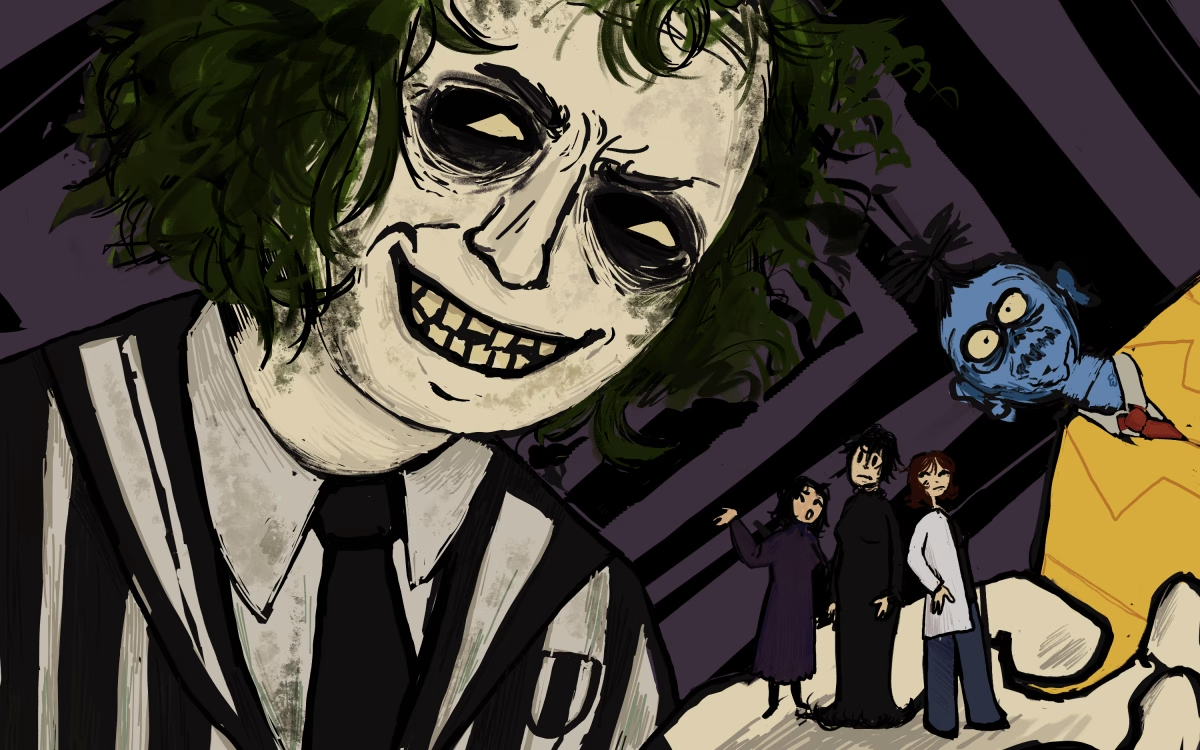Not that I was alive (or at least conscious) to remember it, but there was a time where the words “Directed by Tim Burton” truly meant something.
Seeing Burton’s name on a project used to immediately conjure wonderful visions in the minds of moviegoers. Not many mainstream filmmakers were able to create worlds oozing with macabre gothicism and populate them with eccentric characters that audiences had never seen before.
And out of a more than forty year long career, with massive successes like “Edward Scissorhands” and “Batman,” few of his films have had a lasting impact on pop culture like his 1988 film “Beetlejuice.” The horror-comedy about a recently deceased couple dealing with a yuppie family moving in and a “bio-exorcist” nuisance is still as wildly original and creatively dazzling as studio filmmaking gets.
So after a slump in the 2010s of projects with consistently middling critical receptions and even worse CGI, it shouldn’t come as a huge shock that Burton would choose to reboot one of his most celebrated classics. What is pleasantly surprising is that “Beetlejuice Beetlejuice” is easily his greatest film in almost two decades and a rock solid return to form for the director.
Thirty-six years after the events of the first film, the Deetz family — clairvoyant Lydia (Winona Ryder), her artist stepmother Delia (Catherine O’Hara) and alienated daughter Astrid (Jenna Ortega) — returns to the town of Winter River, Connecticut for the funeral of the family patriarch Charles.
But amidst an impromptu Halloween wedding, a fling with a local boy (Arthur Conti) and the resurrection of a vengeful ex-wife (Monica Bellucci), they find themselves back in cahoots with the ghost Betelgeuse (Michael Keaton) on a wild ride through the afterlife.
If that sounds like a lot of plot for a movie that runs a relatively tight 1 hour and 45 minutes, that’s because it is. But for what bumps and kinks it has, “Beetlejuice Beetlejuice” is still an utter delight to watch.
Burton forgoes prioritizing any one story, instead allowing the film to consistently divert into tangents. Despite how narratively insignificant they may be, they’re made up for with all of the weird, vivid designs and imagery he scatters throughout the afterlife.
Even if I didn’t know how ugly and garish Burton’s CGI nightmares like “Charlie and the Chocolate Factory” and “Alice in Wonderland” were, it’s truly refreshing to see a new release that’s almost overflowing with so many detailed practical effects and colorful sets. The below-the-line creative team here, featuring costume designer Colleen Atwood and “Wednesday” production designer Mark Scruton, absolutely deserves the highest commendation imaginable.
It’s also easy to have a good time with this movie when everyone in the ensemble cast, returning players and newcomers alike, is clearly having the time of their life.
Despite all the time that has passed, Ryder, Keaton and O’Hara all feel so natural back in the roles of Lydia, Betelgeuse and Delia. Justin Theroux especially makes for a wonderful de-facto repeat of Otho, the Deetzes’ snarky interior designer from the original film, as Rory, Lydia’s boyfriend/phony producer of her paranormal investigator show.
But to talk about any of the performances in this film is really just to talk about Ortega — who might literally be the most important factor in this movie’s very existence.
Between “Wednesday” and this film, Ortega is proving herself to be a great revitalizing force for Burton’s career. She almost bears as strong of a screen presence as Johnny Depp and Helena Bonham Carter once did for the director, and I’m totally on board for any collaborations between the two in the future.
Ortega has the most important role to play here, and she pulls it off with ease. Astrid acts as a surrogate for younger Lydia’s personality from the first film, but her resentment of her mother’s belief in ghosts is an effective shift for her character, as is her grief for her dead father that’s a driving force for the film.
There’s no shortage of overly reverent fan-service for the original “Beetlejuice,” as well as some overly convenient throwaway explanations to tie up any loose ends between the two films. But screenwriters Miles Millar and Alfred Gough successfully walk the legacy sequel tightrope here, including some of the most famous bits from the first film while bringing enough new material to the table to keep things fresh.
“Beetlejuice Beetlejuice” is certainly not a film that’s reinventing any wheels, but as just another “Beetlejuice” vehicle, it gets the job done without any major offenses, and that’s all it ever really needed to do.
Related Stories
Support Student Journalism!
The DePaulia is DePaul University’s award-winning, editorially independent student newspaper. Since 1923, student journalists have produced high-quality, on-the-ground reporting that informs our campus and city.
We rely on reader support to keep doing what we do. Donations are tax deductible through DePaul's giving page.




Andre / Sep 16, 2024 at 11:59 am
Quite well-written review.